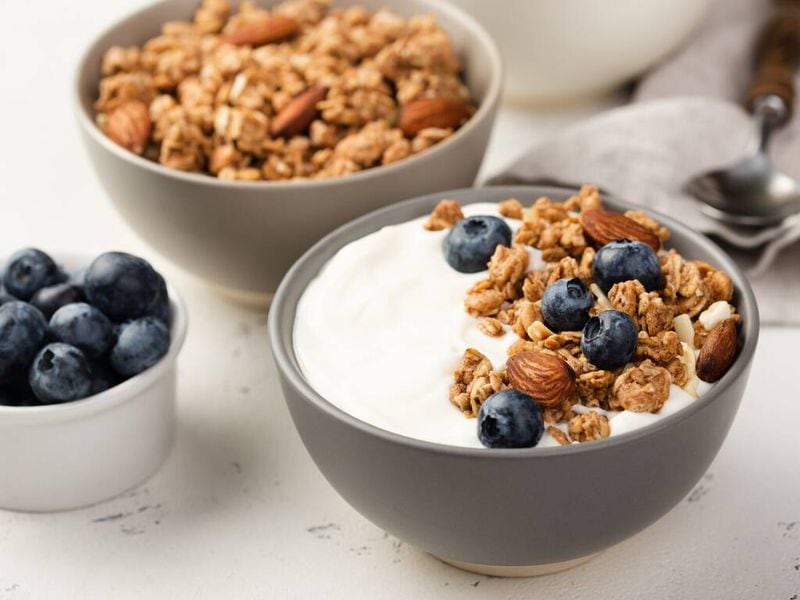Gut health is essential for being healthy and preventing illnesses such as a weakened immune system, gastrointestinal illnesses or even poor mental health. These are the foods you should eat to avoid it.
Even if we don’t notice it, Billions of microorganisms such as bacteria, viruses, fungi and protozoa exist in the gastrointestinal tract. . All of them are called the gut microbiome. Most of them are important for health and others can cause illness.
Increasing evidence, from animal models and human studies, shows that all those intestinal microbes They are essential to many aspects of health, from immunological, metabolic and neurobehavioral traits.
However, various factors can intervene in its proper development: diet, lifestyle, consumption of antibiotics or even the aging process, which will determine changes in its composition. This is why specialists recommend support gut health with superfoods.
Superfoods according to Medical news today are products that have a high nutritional level, that is to say “They provide a substantial amount of nutrients and very few calories.” In this way, they are super healthy foods.
However, it is important to keep in mind that not all healthy foods are superfoods, as they must offer exceptional health benefits to be considered in this “top” category.

“Superfoods help promote health by increasing your immune function and decreasing your chances of disease prevention or progression.” said dietitian Beth Czerwony at Cleveland Health Clinic.
Why is it important to have good gut health and digestion?
A healthy gut is essential to a person’s overall well-being, as the digestive system plays a crucial role in absorbing nutrients, eliminating waste, and protecting against pathogens, as a large part of the immune system is located in the digestive tract. Good gut health is essential for a strong immune system that can defend itself.
“A healthy gut means you have a stronger immune system, better mood, efficient and discomfort-free digestion, and a healthy brain and heart,” said Dr. Sabine Hazan, gastroenterologist and founder of Ventura Clinical Trials in Ventura, California. according to Forbes Health.
Several factors contribute to having good intestinal and digestive health, such as lead a healthy lifestyle that includes a balanced diet rich in fiber, adequate water consumption, stress control, regular physical activity and avoiding excessive alcohol and tobacco consumption. Additionally, it is essential to pay attention to any digestive symptoms or issues and seek medical attention if necessary.
Some symptoms of an unhealthy gut are: abdominal pain; swelling; changes in stools such as chronic diarrhea, chronic constipation, or alternating between the two; excessive flatulence, unexplained fatigue, unexplained weight changes, pain when passing stools, lack of sleep, rectal bleeding, irritable bowel, acid reflux, and skin irritation, among others.
These symptoms can vary in severity and duration , and it is important to remember that the presence of one or more of these symptoms does not necessarily indicate a serious problem. However, if these symptoms persist or significantly affect quality of life, It is advisable to consult a healthcare professional for proper diagnosis and treatment.
5 Superfoods to Improve Gut and Digestive Health According to Science
1. Yogurt as a source of probiotics
This fermented milk product is rich in probiotics which are beneficial bacteria for the intestine. Probiotics can help maintain a healthy balance of gut microbiota, essential for digestion and immune function.

“There is evidence that probiotics, such as those found in yogurt, “They may help improve symptoms of certain digestive problems, like irritable bowel syndrome and certain types of diarrhea.” informed Harvard Health.
According to a study As of 2021, there is evidence that certain probiotics in yogurt, such as bifidobacteria and lactobacilli, may improve symptoms of irritable bowel syndrome.
A nice review of studies found that adults with irritable bowel syndrome who consumed dairy products containing bifidobacteria for 3 to 6 weeks had significant improvement in irritable bowel syndrome symptoms and abdominal pain.
THE studies They also show that The probiotics found in yogurt can protect against diarrhea, constipation and benefit the gastrointestinal tract.
2. Apples as a source of fiber
Apples are a natural source of fiber, primarily in the form of pectin, which can help regulate bowel movements and support digestive health. They also contain antioxidants that can help protect intestinal cells, vitamin C, and healthy carbohydrates.
According to studies , Pectin is a type of fiber found in apples and acts as a prebiotic, positively affecting the gut microbiome and supporting healthy digestion.
Recent search show that regular consumption of apples can positively change the gut microbiome, leading to better protection against chronic diseases such as heart disease, type 2 diabetes, obesity and cancer.

Additionally, the skin of an apple contains 4.5 grams of fiber (about the recommended daily intake), both soluble and insoluble fiber, which plays an essential role in digestion, such as preventing diarrhea and constipation. , according to Business Insider .
3. Ginger as an anti-inflammatory for healthy digestion
Ginger contains bioactive compounds, such as gingerol, which can stimulate the production of digestive enzymes in the gastrointestinal tract. These enzymes help break down food and make it easier to process.
“Ginger, a natural component of ginger root, improves gastrointestinal motility, which is the speed at which food leaves the stomach and continues through the digestive process. Eating ginger promotes efficient digestion, so food doesn’t sit in the gut as long. “reports Johns Hopkins Medical.

A wide revision 2018 studies report that the anti-inflammatory and antioxidant properties of ginger are beneficial for digestive and intestinal health, as well as the ability to relieve discomfort caused by gas in the digestive tract. Its anti-inflammatory properties also help fight inflammation in the intestine.
Among its benefits, it stimulates digestion, relieves stomach aches and nausea, reduces inflammation of the gastrointestinal tract, relieves colic and intestinal cramps, prevents constipation and reduces intestinal gas.
4. Sauerkraut as a fermented food
Fermented foods like sauerkraut, kimchi, miso, kombucha and natto contain probiotics, which are microorganisms that benefit the digestive system . These fermented foods help colonize the gut with beneficial bacteria, essential for proper digestion and nutrient absorption.
Additionally, they can increase the diversity of bacteria in the gut, which is an indicator of a healthy gut microbiota. A diverse microbiota is associated with better digestion and stronger immune function.
“Naturally fermented foods are getting a lot of attention from health experts these days because can help strengthen your gut microbiome, the more than 100 trillion bacteria and microorganisms that live in your digestive tract . “Researchers are beginning to link these little creatures to all kinds of health problems, from obesity to neurodegenerative diseases,” reports Harvard Health.
Desert News explains that a small Norwegian study found that people who added sauerkraut to their diet for six weeks saw improved symptoms of irritable bowel syndrome and better gut microbiota health.

Other study In 2021, the Stanford School of Medicine asked healthy American adults to add fermented foods like cottage cheese and kimchi to their diet for 10 weeks. The participants experienced a significant increase in “gut microbe diversity and decrease in molecular signs of inflammation.”
5. Kefir to treat gastrointestinal diseases
Kefir is a fermented beverage made from kefir granules, which are colonies of beneficial bacteria and yeast. These granules are added to milk and left to ferment for a while.
This superfood is an excellent source of probiotics and nutrients such as protein, calcium, magnesium and vitamin B12, according to Health Line .
“Kefir contains around 12 active probiotic strains. When you eat foods rich in probiotics and postbiotics like kefir, you add more good bacteria to your gut. “They ward off harmful bacteria and promote gut health,” reports the Cleveland Health Clinic .
According to reports Desert News A analysis on the effects of probiotics present in kefir explains that regular consumption of these probiotics It can treat and prevent several gastrointestinal diseases such as: pouchitis, antibiotic-associated diarrhea, irritable bowel syndrome and infectious diarrhea.
Furthermore, a study from 2014 found that adults with chronic constipation who regularly consumed kefir products had significant improvement in their symptoms. At the end of the study, 80% of participants reported increased gut satisfaction.

Source: Latercera
I am David Jack and I have been working in the news industry for over 10 years. As an experienced journalist, I specialize in covering sports news with a focus on golf. My articles have been published by some of the most respected publications in the world including The New York Times and Sports Illustrated.


